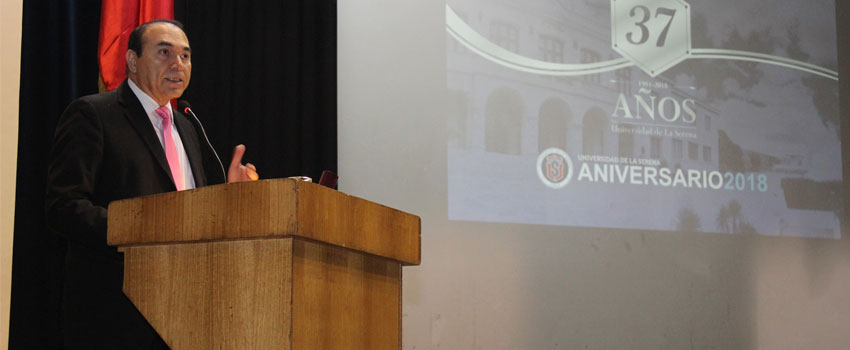
During the ceremony, the highest authority of the state campus highlighted the main achievements in Teaching, Management, Research, Postgraduate, Links with the Environment and Student Affairs, and the challenges that the institution will have to face.
In the Aula Magna Ignacio Domeyko and before a large audience, the Official Inauguration Ceremony of the 2018 Academic Year of the University of La Serena and the 2017 public account of the Rector of the house of higher studies, Dr. Nibaldo Avilés Pizarro, were held , act framed in the thirty-seventh anniversary of the state campus.
Regional and community authorities, the Armed Forces and Law Enforcement and Security, as well as members of the university community, participated in this ceremony in which the highest authority of the ULS highlighted the main achievements in Teaching, Management, Research, Postgraduate, Links with the Environment and Student Affairs.
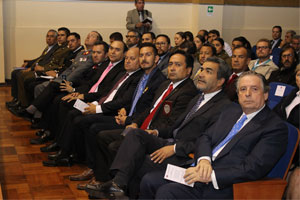 On the occasion, Dr. Avilés reviewed the policies implemented and the progress made in the last decade, where "we have witnessed sustained growth and institutional development, which has required a strong commitment to quality from the entire university community. This is how the University of La Serena has become a house of higher studies of a complex type within the National University System”.
On the occasion, Dr. Avilés reviewed the policies implemented and the progress made in the last decade, where "we have witnessed sustained growth and institutional development, which has required a strong commitment to quality from the entire university community. This is how the University of La Serena has become a house of higher studies of a complex type within the National University System”.
The adequate implementation and sustainability of the Educational Model, the process of curricular renewal, the organization and systematization of the activities of Linkage with the Environment, the management of projects, and the strengthening of the development of Research, were some of the aspects highlighted in its speech.
Precisely, regarding the Research area, he specified that a decade ago the institution reached 32 scientific publications, while currently a record number of 174 WOS publications was achieved, reflecting that "the policy implemented in terms of research gave results". . Dr. Nibaldo Avilés recalled that "in the last institutional accreditation process, we have incorporated the Research area, and our next goal is the Postgraduate area."
In this area, he also highlighted the creation of the so-called "Accreditable" Doctorates, pointing out that 4 of them already have accreditation before the CNA and a fifth has just been created (Doctorate in Energy, Water and Environment), which also complies with the accreditation conditions.
In addition, he emphasized the policy of improvement, maintenance and construction of physical spaces for teaching, research and general use. In addition to this, there are currently projects to incorporate universal accessibility conditions for people with disabilities.
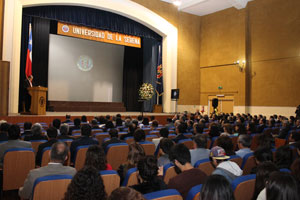 Some of the works mentioned were the construction of Study Workshops and a Reading Room with a capacity of 140 study places on the Andrés Bello Campus, the construction of two classrooms with a capacity of 80 students each on the Enrique Molina Garmendia Campus, the repair of facilities and workshops for the Design degree located on the Isabel Bongard Campus, and the fitting out of the panoramic elevator on the Ignacio Domeyko Campus, among other initiatives, which have meant, in global terms, an investment of close to 900 million pesos.
Some of the works mentioned were the construction of Study Workshops and a Reading Room with a capacity of 140 study places on the Andrés Bello Campus, the construction of two classrooms with a capacity of 80 students each on the Enrique Molina Garmendia Campus, the repair of facilities and workshops for the Design degree located on the Isabel Bongard Campus, and the fitting out of the panoramic elevator on the Ignacio Domeyko Campus, among other initiatives, which have meant, in global terms, an investment of close to 900 million pesos.
In turn, he stated that as part of the gradual implementation, the construction of ramps in the Hall sector of the Ignacio Domeyko Campus is contemplated, as well as accessibility works to the CETECFI building and the Biology sector on the Andrés Bello Campus, to name just a few. some initiatives, which means an approximate investment of 57 million pesos. And, through the Institutional Improvement Plan on initial teacher training, the improvement of 9 classrooms of the pedagogy careers is considered, for 38 million pesos, together with the remodeling of the Laboratory of the Center for Language Studies, for more than 15 million pesos.
The highest university authority also stated that "we are about to build our building that will house the Psychology and Nursing careers, in La Serena, a management that has been extensive in terms of financing, administrative and technical aspects, which they have been surpassed. Now we only hope to comply with the rigorous processes that the Comptroller's Office and the Public Procurement Law require of us”.
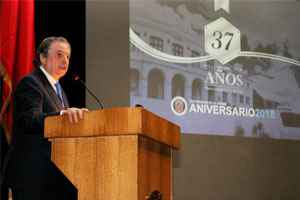 Similarly, the Chancellor highlighted that the ULS Computing and Information Center "today is the most modern in the northern macro-zone, in terms of capacity, speed, and academic and administrative platforms." An example of this, he indicated, is the modernization of the institutional Data Center, which is the core of all network and telecommunications services, platforms and Information Technology projects of the University.
Similarly, the Chancellor highlighted that the ULS Computing and Information Center "today is the most modern in the northern macro-zone, in terms of capacity, speed, and academic and administrative platforms." An example of this, he indicated, is the modernization of the institutional Data Center, which is the core of all network and telecommunications services, platforms and Information Technology projects of the University.
He also emphasized the implementation "of a policy in keeping with the times in which we live, and which is to promote and count on a greater participation of union associations and students in the most important decisions of the University, as well as decisively addressing highly relevant topics such as gender equality, human rights, inclusion, indigenous peoples, interculturality, harassment and discrimination. The latter requires a regulation that is already under study”.
upcoming challenges
According to what was indicated by the Rector of the ULS, one of the challenges that the institution will have to face is “the consolidation of Research, an accredited area, but one that requires further strengthening; and on the other hand, the accreditation of the Postgraduate Area. This means planning and implementing an operational plan that represents the objectives contained in the Strategic Development Plan. We have the organization and the academic, administrative and financial conditions for that achievement”.
In addition, he indicated that this year it is expected to respond to a long-awaited project by academic associations and teachers who have been contracted for a long period: the reclassification project that allows them to own the position. "The pre-design stage is complete and it is expected to start raising awareness, dissemination and presentation of the project to the collegiate bodies after updating the academic information", he assured.
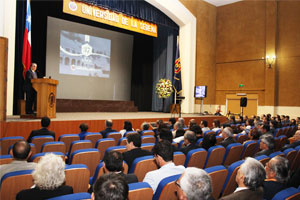 Lastly, he stressed that it is expected to continue reinforcing matters such as participation, gender equality, inclusion, interculturality, human rights, non-discrimination and the prevention of harassment, "social and cultural challenges, which will allow us to have a university that society imposes on us today. And of course, our new Statute”.
Lastly, he stressed that it is expected to continue reinforcing matters such as participation, gender equality, inclusion, interculturality, human rights, non-discrimination and the prevention of harassment, "social and cultural challenges, which will allow us to have a university that society imposes on us today. And of course, our new Statute”.
Keynote talk and recognition of officials
During this act, Dr. Juan José Almagro, Doctor of Labor Sciences, Vice President of UNICEF Spain and President of the Council of the Chair of Corporate Social Responsibility of the University of Alcalá de Henares, gave those present the keynote talk "Leading is also educate".
In his presentation, the academic and researcher referred to the challenges that universities face in training ethical people with principles based on integration. Furthermore, he stated that
The houses of studies have the difficult mission of training people, "because they are the ones who, through good practices, should be the ones who command the organizations and that it is not fame and money that do it."
Finally, he indicated that "if you act professionally and behave ethically, go home with the satisfaction of having fulfilled your duty, because ethics is the new revolution."
In this solemn ceremony, recognitions were also given to officials who complete 20 and 30 years of service at the University, in addition to the "Official Merit" award.
See photo gallery
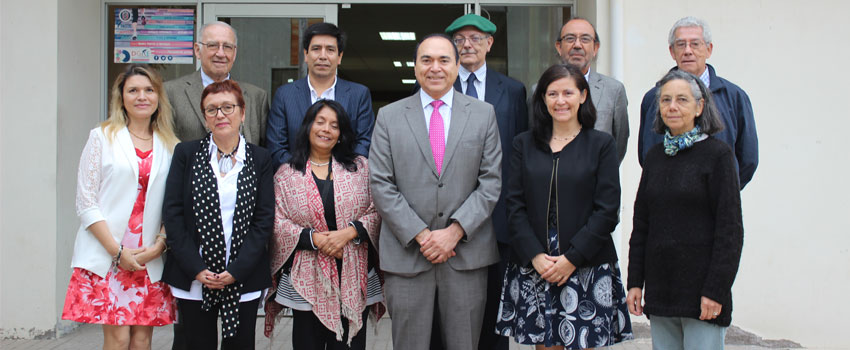
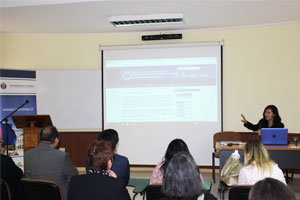 This Committee aims to address the interrelationships between the generation of knowledge and the protection of people, animals and the environment, derived from research carried out under the protection or sponsorship of this Institution, supporting the rights of people who participate voluntarily. in investigations and in the care of sensitive data, safeguarding their identity and confidentiality through authorization commitments under informed consent.
This Committee aims to address the interrelationships between the generation of knowledge and the protection of people, animals and the environment, derived from research carried out under the protection or sponsorship of this Institution, supporting the rights of people who participate voluntarily. in investigations and in the care of sensitive data, safeguarding their identity and confidentiality through authorization commitments under informed consent.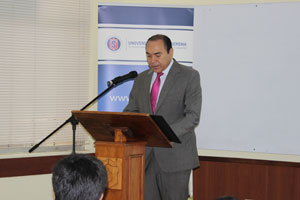 For his part, the Vice-Rector for Research and Postgraduate Studies highlighted the importance that the University gives to the development of scientific research, supporting the creation of committees like this one. “The work carried out by this Committee is quite arduous, seeking to comply with today's demands when it comes to achieving accreditation. And thank you for the support that has been given to this area of work by the Rector's Office,” he indicated.
For his part, the Vice-Rector for Research and Postgraduate Studies highlighted the importance that the University gives to the development of scientific research, supporting the creation of committees like this one. “The work carried out by this Committee is quite arduous, seeking to comply with today's demands when it comes to achieving accreditation. And thank you for the support that has been given to this area of work by the Rector's Office,” he indicated.
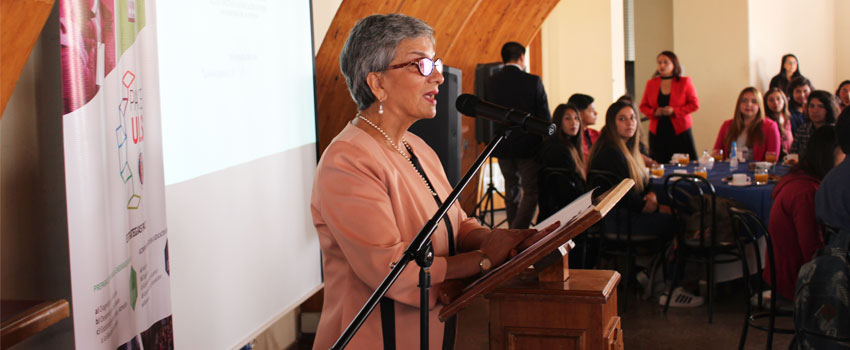
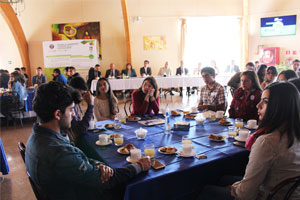 The Director of ULS Teaching expressed her pleasure at receiving these 100 students from the 2018 generation who are entering the house of higher education. “Today is the first approach of these students to the authorities, teachers and new colleagues at our university, in an atmosphere of camaraderie and not in such a formal context. I have no doubt that they will be successful in university life, since they far surpassed the first challenge, which is to enter the University; Already within it, we are willing, as an institution, to support them to obtain their professional degree,” she expressed.
The Director of ULS Teaching expressed her pleasure at receiving these 100 students from the 2018 generation who are entering the house of higher education. “Today is the first approach of these students to the authorities, teachers and new colleagues at our university, in an atmosphere of camaraderie and not in such a formal context. I have no doubt that they will be successful in university life, since they far surpassed the first challenge, which is to enter the University; Already within it, we are willing, as an institution, to support them to obtain their professional degree,” she expressed.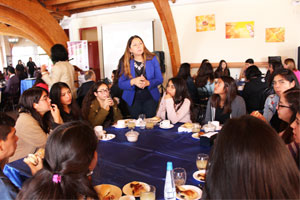 On the other hand, Patricia Astroza, Coordinator of the ULS Student Welfare Department, expressed that this is a very beneficial instance for new students. “It seems to me to be a very important milestone in the lives of young people and for us as a University, and an instance in which they can share with the authorities, with their fellow tutors. I especially consider it relevant that they feel incorporated from the first moment in the University. I wish each and every first-year student much success and I believe that the key to success is personal effort, getting up after a failure and achieving goals, in this case being professional; “I am happy to collaborate with the PACE program and to continue working so that more students fulfill their dream of entering Higher Education and finishing it in the best way,” she specified.
On the other hand, Patricia Astroza, Coordinator of the ULS Student Welfare Department, expressed that this is a very beneficial instance for new students. “It seems to me to be a very important milestone in the lives of young people and for us as a University, and an instance in which they can share with the authorities, with their fellow tutors. I especially consider it relevant that they feel incorporated from the first moment in the University. I wish each and every first-year student much success and I believe that the key to success is personal effort, getting up after a failure and achieving goals, in this case being professional; “I am happy to collaborate with the PACE program and to continue working so that more students fulfill their dream of entering Higher Education and finishing it in the best way,” she specified.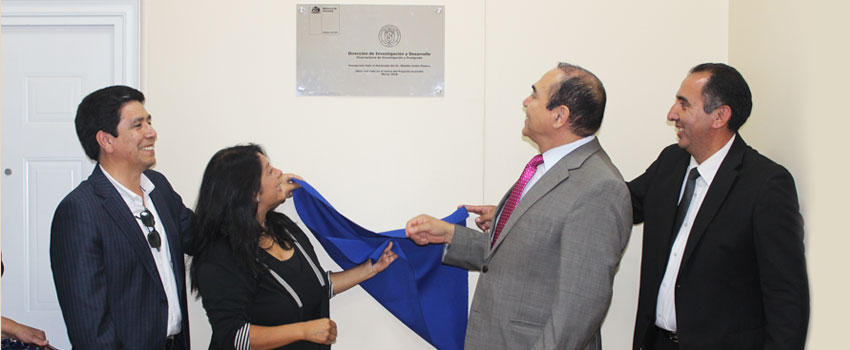
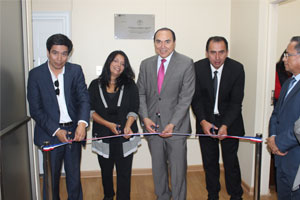 In the activity, the Vice-Rector for Research and Postgraduate Studies, Dr. Eduardo Notte, was emphatic in emphasizing the importance of developing research at the University, advancing the concept of “Complex University” and complying with institutional requirements, exercising a commitment to the same. This is how in the instance, he addressed the fact that there are 4 Doctorate programs accredited by the National Accreditation Commission, an important step for the university and official recognition for the professionals who carry out this work within the institution.
In the activity, the Vice-Rector for Research and Postgraduate Studies, Dr. Eduardo Notte, was emphatic in emphasizing the importance of developing research at the University, advancing the concept of “Complex University” and complying with institutional requirements, exercising a commitment to the same. This is how in the instance, he addressed the fact that there are 4 Doctorate programs accredited by the National Accreditation Commission, an important step for the university and official recognition for the professionals who carry out this work within the institution.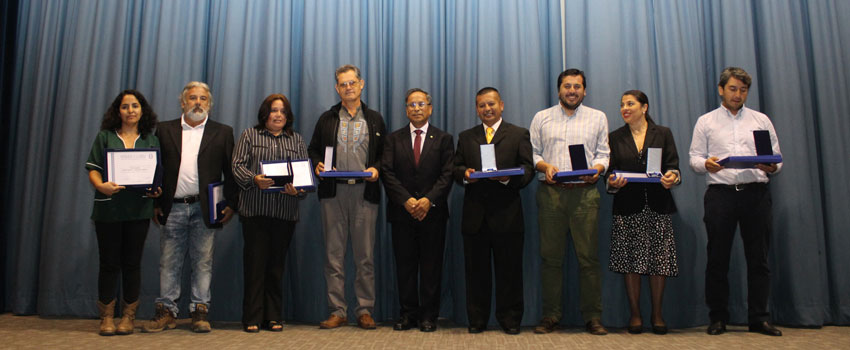
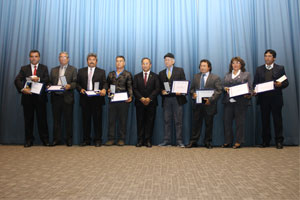 This is how the distinction of “Civil Seniority” was awarded to Juanita Acevedo Salinas (Kindergarten), César Aguilera Fernández (Directorate of Services), Danitza Altamirano Urrutia (Dept. of Mathematics), Francisco Araujo Caiafa (Dept. of Health), Pedro Carrera Barraza (Dept. of General Services), Mauricio Costa Pizarro (Dept. of Personnel Welfare), Nancy Díaz Díaz (Dept. of Mining Engineering), Cristian Galarce Césped (Dept. of Architecture), Rodrigo Gallardo Álvarez (Director of Teaching), María Isabel Galleguillos Rojas (Dept. of General Services), Rodrigo Gálvez Gálvez (Dean of the Faculty of Humanities), Carlos Lagos Moraga (Dept. of Mobilization and Transportation), Claudia Munizaga Álvarez (Kindergarten), José Pastén Valencia (Dept. . General Services), Carmen Rojas Aguirre (DGAE), Pedro Vergara Rodríguez (Dept. of Physical Education and Sports) and Marcela Zúñiga Griffith (Dept. of Health), who have provided 20 years of service to the University.
This is how the distinction of “Civil Seniority” was awarded to Juanita Acevedo Salinas (Kindergarten), César Aguilera Fernández (Directorate of Services), Danitza Altamirano Urrutia (Dept. of Mathematics), Francisco Araujo Caiafa (Dept. of Health), Pedro Carrera Barraza (Dept. of General Services), Mauricio Costa Pizarro (Dept. of Personnel Welfare), Nancy Díaz Díaz (Dept. of Mining Engineering), Cristian Galarce Césped (Dept. of Architecture), Rodrigo Gallardo Álvarez (Director of Teaching), María Isabel Galleguillos Rojas (Dept. of General Services), Rodrigo Gálvez Gálvez (Dean of the Faculty of Humanities), Carlos Lagos Moraga (Dept. of Mobilization and Transportation), Claudia Munizaga Álvarez (Kindergarten), José Pastén Valencia (Dept. . General Services), Carmen Rojas Aguirre (DGAE), Pedro Vergara Rodríguez (Dept. of Physical Education and Sports) and Marcela Zúñiga Griffith (Dept. of Health), who have provided 20 years of service to the University.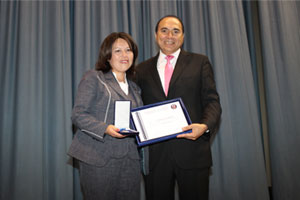 It should be noted that the recognized officials who were present at the activity received distinctions from the Vice-Rector for Economic and Administrative Affairs, Mg. Waldo Valencia.
It should be noted that the recognized officials who were present at the activity received distinctions from the Vice-Rector for Economic and Administrative Affairs, Mg. Waldo Valencia.
 On the occasion, Dr. Avilés reviewed the policies implemented and the progress made in the last decade, where "we have witnessed sustained growth and institutional development, which has required a strong commitment to quality from the entire university community. This is how the University of La Serena has become a house of higher studies of a complex type within the National University System”.
On the occasion, Dr. Avilés reviewed the policies implemented and the progress made in the last decade, where "we have witnessed sustained growth and institutional development, which has required a strong commitment to quality from the entire university community. This is how the University of La Serena has become a house of higher studies of a complex type within the National University System”. Some of the works mentioned were the construction of Study Workshops and a Reading Room with a capacity of 140 study places on the Andrés Bello Campus, the construction of two classrooms with a capacity of 80 students each on the Enrique Molina Garmendia Campus, the repair of facilities and workshops for the Design degree located on the Isabel Bongard Campus, and the fitting out of the panoramic elevator on the Ignacio Domeyko Campus, among other initiatives, which have meant, in global terms, an investment of close to 900 million pesos.
Some of the works mentioned were the construction of Study Workshops and a Reading Room with a capacity of 140 study places on the Andrés Bello Campus, the construction of two classrooms with a capacity of 80 students each on the Enrique Molina Garmendia Campus, the repair of facilities and workshops for the Design degree located on the Isabel Bongard Campus, and the fitting out of the panoramic elevator on the Ignacio Domeyko Campus, among other initiatives, which have meant, in global terms, an investment of close to 900 million pesos. Similarly, the Chancellor highlighted that the ULS Computing and Information Center "today is the most modern in the northern macro-zone, in terms of capacity, speed, and academic and administrative platforms." An example of this, he indicated, is the modernization of the institutional Data Center, which is the core of all network and telecommunications services, platforms and Information Technology projects of the University.
Similarly, the Chancellor highlighted that the ULS Computing and Information Center "today is the most modern in the northern macro-zone, in terms of capacity, speed, and academic and administrative platforms." An example of this, he indicated, is the modernization of the institutional Data Center, which is the core of all network and telecommunications services, platforms and Information Technology projects of the University. Lastly, he stressed that it is expected to continue reinforcing matters such as participation, gender equality, inclusion, interculturality, human rights, non-discrimination and the prevention of harassment, "social and cultural challenges, which will allow us to have a university that society imposes on us today. And of course, our new Statute”.
Lastly, he stressed that it is expected to continue reinforcing matters such as participation, gender equality, inclusion, interculturality, human rights, non-discrimination and the prevention of harassment, "social and cultural challenges, which will allow us to have a university that society imposes on us today. And of course, our new Statute”.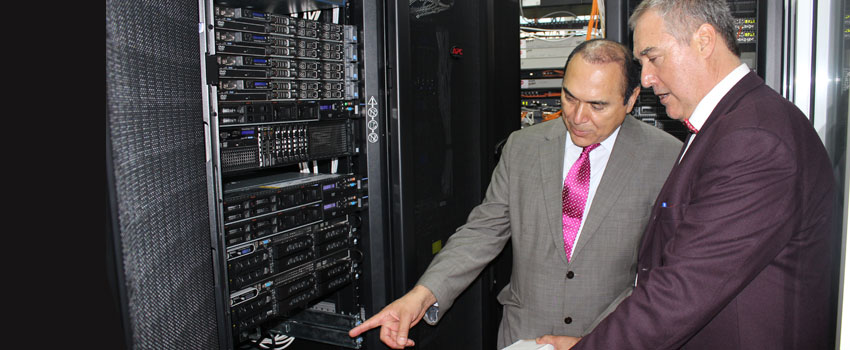
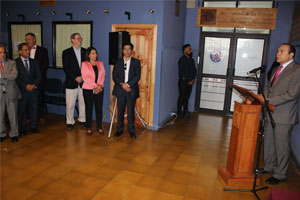 The institutional Data Center, which is managed by CICULS, is the core of all network and telecommunications services, platforms and IT projects of the University of La Serena and has become a tool available to the university community, where will be able to develop and host Technological Innovation projects such as Big Data, Internet of Things, scientific computing, data clouds, business intelligence, data mining, astro computing, neural networks, particle simulation, Data-driven planning and Robot Education, among many other relevant and contingent technologies.
The institutional Data Center, which is managed by CICULS, is the core of all network and telecommunications services, platforms and IT projects of the University of La Serena and has become a tool available to the university community, where will be able to develop and host Technological Innovation projects such as Big Data, Internet of Things, scientific computing, data clouds, business intelligence, data mining, astro computing, neural networks, particle simulation, Data-driven planning and Robot Education, among many other relevant and contingent technologies.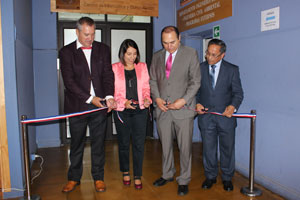 This strategic location of the institution has a 10 Gbps link to the world between the Data Center and the REUNA Data Center, allowing navigation on the Academic Internet and Internet 2, navigation of content providers such as Google and Microsoft and the commercial internet browsing. In addition, it has electrical security services that allow working 24/7, and data security through a state-of-the-art Firewall.
This strategic location of the institution has a 10 Gbps link to the world between the Data Center and the REUNA Data Center, allowing navigation on the Academic Internet and Internet 2, navigation of content providers such as Google and Microsoft and the commercial internet browsing. In addition, it has electrical security services that allow working 24/7, and data security through a state-of-the-art Firewall.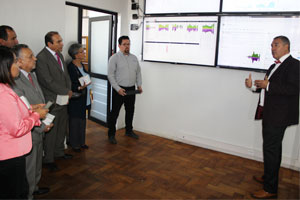 For the Executive Director of REUNA (National University Network), Paola Arellano, indicated that as a Consortium, “we know that the University of La Serena has an important role and commitment to the development of its region and also of the northern macrozone; To achieve this, it has a body of top-level professionals and academics, and it is precisely for this reason that the development of digital infrastructures, and especially the modernization of its Data Center, plays a vital role so that its community has the conditions to support the most efficient development of academic work, networking, internationalization, and of course, the strategic management of the University.”
For the Executive Director of REUNA (National University Network), Paola Arellano, indicated that as a Consortium, “we know that the University of La Serena has an important role and commitment to the development of its region and also of the northern macrozone; To achieve this, it has a body of top-level professionals and academics, and it is precisely for this reason that the development of digital infrastructures, and especially the modernization of its Data Center, plays a vital role so that its community has the conditions to support the most efficient development of academic work, networking, internationalization, and of course, the strategic management of the University.”